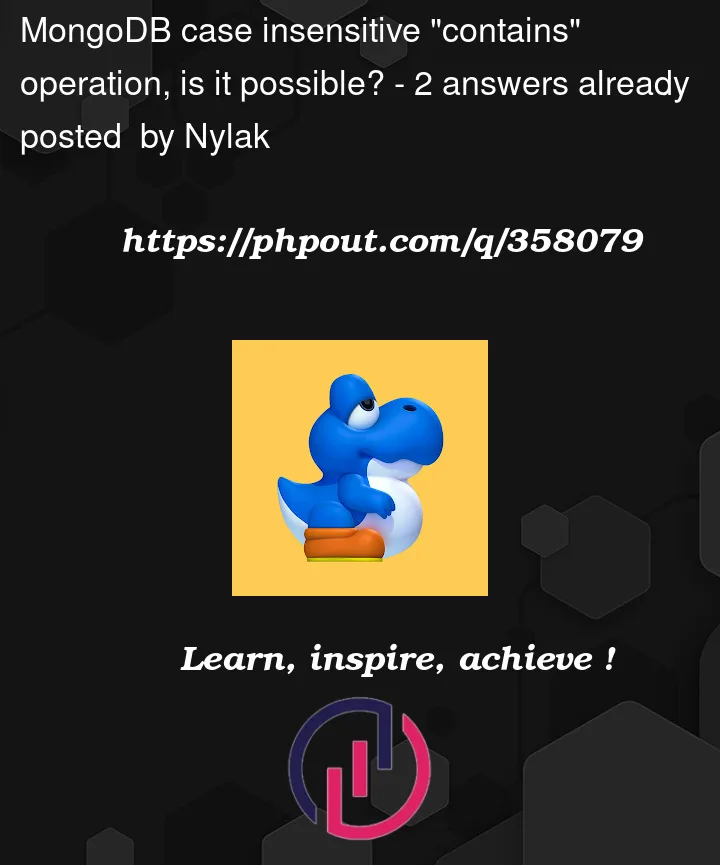Here’s my situation :
In my MongoDB Database, I have a list of objects.
Using an GraphQL API, I can search them using a filter.
This filter creates a ‘contains’ filter input with my value, ‘bar’ for example.
However, when the request is finished, I only get object that exactly matches the ‘bar’ sequences, even if I have other variants of the ‘bar’ sequence ‘Bar, BAR, and so on…).
I’ve tried many implementations in my C# project (Custom Filtering, Custom Convention, …) but nothing seems to be working.
here’s an example of the request :
query SEARCH{
search (
id: {
wksUuid:"id1",
prjUuid:"id2",
fileUuid:"id3",
fileVersion:"id4",
stepLine:"id5"
}
)
{
foo
(
first: 30
after: null,
order: null,
where: {
name:{
contains: "bar"
}
}
) {
pageInfo {
hasNextPage
endCursor
}
nodes {
name
}
}
}
}
This request is treated as such in my package :
public async getFooItems(id: id, first?: string, cursor?: string, order?: any[], filters?: any): Promise<ResponseAPICall<any>> {
const stringifiedId: string = JSON.stringify(id)?.replace(/"([^"]+)":/g, '$1:')
const query: string = this.SEARCH.replace('$id', stringifiedId)
.replace('$cursor', cursor ? `"${cursor}"` : 'null')
.replace('$first', first ? first : 'null')
.replace('$order', (order && order?.length > 0) ? JSON.stringify(order)?.replace(/['"]+/g, '') : 'null')
.replace('$filters', filters ? JSON.stringify(filters)?.replace(/"(w+)":/g, "$1:")?.replace(/"([^"]+)":/g, '$1:') : 'null')
const body: {query: string} = { query: query }
const response: ResponseAPICall<any> = await this.httpRqs.post(this.apiUrl, body)
return response
}
Is it even possible, using HotChocolate, MongoDB.Driver to apply a case insentive argument on the ‘Contains’ operation ?
- Custom String Filter (C#) : Implementation of a custom filter to override the contain operation, didn’t work.
- Custom FilterConvention : Custom FilterConvention to override the current convention, Failed
- Followed Extending Filtering, didn’t work (the contain operation wasn’t override on my request)
- Tried to edit the filter before the request is sent, failed (can’t convert a StringType to a RegexType)
Edit : Here’s how my object is resolved inside GraphQL, and I did try to extend said resolver to try and cofigure operations, but didn’t succeed.
public class Foo: ObjectType<Foo>
{
protected override void Configure(IObjectTypeDescriptor<Foo> descriptor)
{
descriptor.Field(_ => _.Id);
descriptor.Field(_ => _.History);
descriptor.Field(_ => _.Name);
descriptor.Field(_ => _.IfcClassName);
descriptor.Field(_ => _.IniesClassifCode);
descriptor.Field(_ => _.Contributor);
descriptor.Field(_ => _.Unit);
descriptor.Field(_ => _.Lot);
descriptor.Field(_ => _.BundleId);
descriptor.Field(_ => _.RelatedContributorsId);
descriptor.Field(_ => _.Qto);
descriptor.Field(_ => _.RelatedEmptyComponentId);
descriptor.Field(_ => _.InodeId);
descriptor.Field<CbzContributorResolver>(_ => _.GetRelatedContributors(default, default))
.Name("relatedContributors")
.UsePaging()
//.UseOffsetPaging()
.UseSorting()
.UseFiltering();
}
}




2
Answers
Did you manage to find a solution, I have the same problem…
Try applying
iflag to make your regex case-insensitive.See: https://stackoverflow.com/a/10610461/5024706